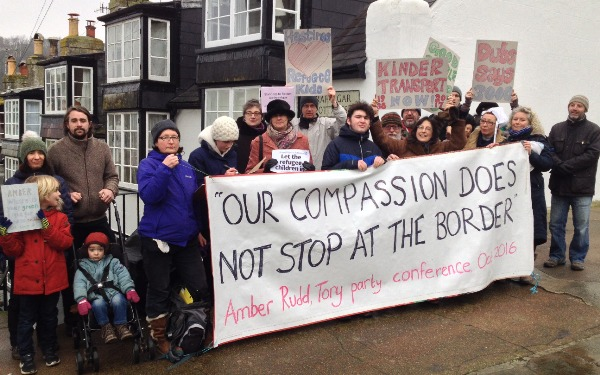A few days ago I saw a makeshift sign out of cardboard with the words “Theresa May history is watching you” written on it. I felt the same way about Amber Rudd earlier this month when she announced that only 350 children would be given a safe route to Britain under the Dubs Amendment, despite initial rumours last summer to resettle 3,000 lone children. I should give Amber Rudd credit – she quietly announced the cap on the eve before the Brexit vote in Parliament, a clever tactic to make sure that this decision isn’t remembered. This government will put more effort into concealing that they are turning away refugees than they will try to accept them.
In 2014 and 2015 there was mass coverage of the refugee and migrant crisis in the EU, but British media was polarised in its messaging, with some newspapers being described as expressing ‘a hostility towards refugees and migrants which was unique’ when compared with other British and European ones.[1] But with the news frenzy of 2016 and no sign of 2017 being any quieter, the plight of people crossing the Mediterranean is out of the limelight. Perhaps that is why the cries against the cap were not as loud as the calls for action which led to the promise to settle lone children in the first place.
While public sentiment towards refugees is improving, the UK population are as polarised as the media on this issue. Nearly half of 16 – 24 year olds think that the UK should accept more refugees, but the likelihood of having this view decreases with age. Nearly half of the public think the UK should be taking in fewer refugees (49%), a decrease from 53% last year. So although charities that support refugees can feel optimistic about changing attitudes, they still have to face public hostility toward asylum seekers.
Our blog guidelines advise us to use our research to calmly argue our point of view. But it’s a bit difficult to feel nothing when I read these two facts:
- 3,740 people died trying to cross the Mediterranean in 2016, a record high.[2]
- Britain is home to just 0.6% of the world’s refugees.[3]
I am embarrassed to be from a country that’s newspapers are known for having a special kind of hatred for refugees. I am ashamed to have a government that has a tactic to ensure broken promises are covered behind more topical headlines.
On top of my anger at the government’s decision to end the scheme in a few months and the great timing of announcing it on the eve of the Brexit vote in Parliament, I feel perplexed at the mixed messages coming from the government on their reasoning. Rudd claims that local councils do not have the capacity to take in more children, and also says that offering shelter might encourage children to try to reach the UK and open them up to people traffickers. It is not the fault of local councils if they don’t have enough funding, and the implication that these children are only seeking asylum because it is offered is frankly delusional. What’s the real reason for ending a refugee resettlement programme that’s named after one of the children Nicholas Winton saved?
I worry that with less media coverage of the plight of asylum seekers than a year and a half ago, and hostility toward refugees from the population, charities that support refugees are facing an uphill battle. But unlike the government, some charities and other influential figures have a clearer stance on the refugee crisis. Help Refugees are already challenging the government in a judicial review, while Safe Passage responded with examples of how ending the programme will directly affect children currently in Greece. A blog post on Amnesty International labelled the move ‘absurd yet predictable’. Now more than ever, these organisations are needed to address fear about migrants, refugees and effects on the UK. Above all, they have the right to remind Amber Rudd of her own words, “compassion does not stop at the border”.

Figure 1: Protesters outside Home Secretary Amber Rudd's house demand justice for child refugees (photo: Peace News)
[1] Press Coverage of the Refugee and Migrant Crisis in the EU: A Content Analysis of Five European Countries, Cardiff University & UNHCR, http://www.unhcr.org/uk/protection/operations/56bb369c9/press-coverage-refugee-migrant-crisis-eu-content-analysis-five-european.html [Accessed February 2017]
[2] UNHCR, http://www.unhcr.org/uk/news/latest/2016/10/580f3e684/mediterranean-death-toll-soars-2016-deadliest-year.html [Accessed February 2017]
[3] Refugee Council, http://www.refugeecouncil.org.uk/latest/news/4350_top_10_global_facts_about_refugees [Accessed February 2017]
Credit to Quinn Dombrowski for Image 1

